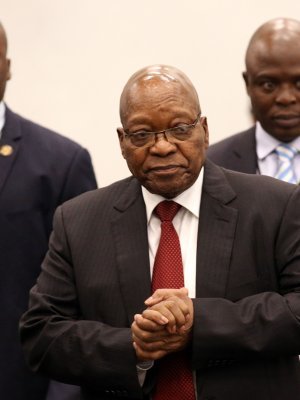State capture is not unique to South Africa; it is prevalent in most developed and developing countries in some or other form. For instance, in Russia, at the beginning of the 1990s there was large-scale privatisation of state assets which led to growth in income inequality and which was aggravated by weak governance of legal and political institutions.
Angola is cited as a further example of state capture, where top-level politicians created a regulatory system that facilitated their private wealth accumulation. Between 1996 and 2002, US$4.2 billion in oil revenues were unaccounted for and channelled through Treasury – the quantum approximates the country’s expenditure on social welfare (Ganesan 2004). The delicacy of democratic institutions coupled with the state’s poor accountability to the public made the government susceptible to “capture”.
...we cannot be certain that we have seen the last of state capture...
The Daily Maverick reported that the state capture of South Africa is estimated to have cost us more than R1.5 trillion in just four years. And we cannot be certain that we have seen the last of state capture with new revelations appearing almost daily.
Joel Hellman, governance specialist in Europe and Central Asia and vice president of the World Bank, defines state capture as the efforts of a small number of firms or individuals to shape the rules of the game to their advantage through illicit, non-transparent provision of private gains to public officials. According to Daniel Kaufman in the Zondo commission, state capture is a “complex web”. But, what were the triggers for state capture in South Africa?
1. A lack of corporate governance
King IV defines corporate governance as the exercise of ethical and effective leadership by the governing body towards the achievement of an ethical culture, good performance, effective control and legitimacy. A lack of, or poor, corporate governance is identified as one of the fundamental causes of state capture.
Policies are evaded and improvements necessary to advance corporate governance are undermined by the collusion of representatives of the state and the preferred private organisations who secure work through public tenders for private gains from a continued environment of weak governance.
The Zondo commission illustrated a powerful example of authority-misinfluence where people in positions of power mismanaged entities and performed unethical acts. Blind trust in the appointed leadership resulted in many employees blindly – and in some instances unknowingly – co-operating in acts of wrongdoing.
The media has cited some good examples where governance has been undermined: “In 2015, the Gupta family influenced SAA into relinquishing its route to India to an Indian airline, Jet Airways”, and “Various municipalities were flummoxed into investing millions into VBS while the bank could not even produce an investment or credit rating”.
In South Africa, it's a common cause that there is no paucity of regulations, resulting in many organisations arguing that they suffer from regulation fatigue. Oversight committees are structured to ensure the development and implementation of policies, and plan for a systematic, disciplined approach to evaluate and improve the effectiveness of risk management, controls, and governance processes within companies.
Various legislations within South Africa detail consequences and penalties to be imposed in cases where individuals are found guilty of an offence. An example can be found in the Public Finance Management Act. No. 1 of 1999 which states: “Offences and penalties. — (1) An accounting officer is guilty of an offence and liable on conviction to a fine, or to imprisonment for a period not exceeding five years if that accounting officer wilfully or in a grossly negligent way fails to comply with the responsibilities as stipulated in the Act.”
In most cases, the public has been disappointed as the cited accountability measures are not implemented. But, are the measures in place enough to promote good governance?
Organisations need to understand that good governance is not achieved through a simple tick box approach to compliance. Similarly, simply filling positions with bodies without the requisite skills and experience is often counterproductive. Board members, management and oversight structure should encourage the need for an effective governance infrastructure. The demand to capture and visualise quantifiable results has never been greater. The use of technology to gain insight from information (big data) is no longer an option but rather a priority for organisations, and will, in time, increase transparency and assist governance structures to address a lack of accountability and the enforcement quandary.
2. Internal control
Why do organisations promote internal control measures when so many failures are uncovered? Media has cited various engagements where state capture has resulted in the perceived elite bypassing established processes and ignoring norms and standards in order to enforce contracts, which resulted in inefficiencies in public service to state the least.
Internal controls are the mechanisms and rules that encompass the policies, procedures, processes, tasks, and behaviours implemented by organisations, which together form the organisations’ effective and efficient operations and provide an appropriate response to significant business, operational, financial compliance and other risks to facilitate the achievement of the organisation’s objectives. They promote integrity of financial and accounting information, accountability and prevent or detect fraud.
In South Africa, the primary vehicle for state capture has been internal control failures within procurement and supply chain management. The Zondo commission has revealed various procurement irregularities where power rested with a small group of people who mismanaged material government funds through weak internal control measures.
The country boasts of independent public and private offices, bodies and organisations that have been tasked to protect the public and identify and report gaps in internal controls. Despite this, the country still encountered gaps in the identification and reporting of internal control failures due to willful negligence, collusion, bribery, and the systemic corruption of individuals.
In South Africa, it's common cause that there is no paucity of regulations...
Internal controls can be expected to provide only reasonable, not absolute, assurance to an organisation’s management and board.
It is the role of the governing bodies to:
· Ensure that effective systems of risk management are established as part of the framework of internal control;
· Set the “tone at the top” by implementing and promoting ethical standards, integrity and accountability policies;
· Hold people accountable for their responsibilities;
· Establish relevant and reliable information systems to track operations, goal progress and compliance; and
· Use monitoring to tie corrective actions back to improvements in internal control.
One must ask how internal controls are being enhanced. Many of the professional bodies have embarked on ground-breaking initiatives to pool their resources and institutional knowledge to foster a culture of accountability and restore credibility to the country’s private and public sectors.
To enhance oversight, organisations need to ensure that there is adequate and appropriate segregation of duties to minimise role conflicts, together with restrictive access to financial systems, increased oversight, third party review of financial statements, and enforced vacation for employees.
The proactive use of Computer Assisted Audited Techniques (CAAT), continuous auditing and predictive data analytics ensure effective monitoring, and evaluation is fast becoming the norm for driving accountability in all organisations. Many organisations have historically relied on manual interventions, however, enhancements in technology have significantly changed this outlook.
3. Unethical behaviour
In 2001, Hellman and Kaufman noted that corruption has taken on an image of so-called oligarchs manipulating policy formation and even shaping the emerging rules of the game to their own, very substantial advantage.
The results of corruption in public procurement are long-lasting and have a negative effect on the welfare of all South Africans, especially at the grassroots level. National Treasury, in protecting the public, has created a database of offenders to register individuals and suppliers that have been fined or have been found to have contributed in procurement irregularities wilfully or in a grossly negligent way. For this process to be effective it also needs ethical individuals to promote and ensure consistent application of the ramifications of those who find themselves on the register.
The results of corruption in public procurement are long lasting...
To make a difference, it is incumbent upon every individual who calls South Africa home to realise they have a vested interest in the ethical environment of the country and that the use of ethics and fraud hotlines to report corruption is our duty.
Past victimisation of whistle-blowers is not an excuse for unethical behaviour, or to turning a blind eye to such behaviour. Ask yourself the hard question and ensure that you have tested your ethical and moral compass. “Ethical behaviour results when one does not merely consider what is good for oneself, but also what is good for others,” said Leon van Vuuren from the Ethics Institute.
4. A lack of accountability
Assigning and pinpointing accountability has been found to be difficult due to South Africa having three distinct spheres of government. The constitution and the intergovernmental relations framework, although clear about the principles of intergovernmental relations, suffers from a disjuncture on how government monitors performance and assigns accountability within the three spheres. There is no integrated approach to performance management within the spheres as they operate in traditional silos, each fighting for its own and the wounded fending for themselves. There is a clear lack of key transversal indicators and governance to enhance accountability.
The impact of a lack of accountability will be felt by the citizens of this country as there is no balance between compliance – a tick-box approach used for monitoring and evaluation – and service delivery.
What can professional service providers do?
Assurance providers, business consultants and other professional service providers have gathered detailed lessons learned and typical “red flags” or “fraud indicators” from state capture. They have identified that hard questions to uncover what the root causes are. As a result, they can assist organisations in several ways:
With the use of predictive data analytics that are able to assist companies to cleanse, convert, or model their data so that management gains a better understanding of potential breakdowns in the supply chain control environment to enable proactive action.
- Couple process reviews with analytics to identify repetitive tasks and transactions that organisations should be thinking of automating to reduce human error and opportunities for corruption.
- Conduct automated internal self-control assessments, where management ranks the effectiveness of their internal controls. This assessment should be linked to the objectives, key performance indicators, risks, controls, and internal audit findings. They provide user-friendly visual representations and quantifiable results for oversight committees.
- By providing independent whistleblowing and fraud hotline services, which promote integrity within an organisation.
- By structuring accountability frameworks in a way that transversal and intergovernmental key indicators form part of monitoring and evaluation so that governance is enhanced.
- By formulating anti-corruption strategies based on fraud risk assessments they can highlight key areas that organisations can focus on to identify and understand fraud risks.
- By providing outsourced supply chain management processes independently from the organisation, which minimise conflicts of interest, delays in the process, and ensure that the process is fair, transparent and unbiased towards predetermined objectives, are cost effective, and equitable.
Conclusion
Difficult conversations have been held and there is a requirement that actions be implemented by the various professions and business leaders to arrest the further spread of corruption. In an article for FWD Business, chartered accountant Ajay Balasubramanian states: “The weaknesses in internal controls get reflected in financials by way of non-compliance to laws and regulations, errors, [instances of] frauds or mismanagement. So, having an effective internal control system must be the backbone of every organisation.” Failures in internal controls should be linked to a consequence management system, which ensures that individuals are held accountable and charged for any misconduct identified.
Tando Mbatsha's biography
Tando Mbatsha is Director Enterprise Risk Management at Nexia SAB&T, a majority black-owned accounting, audit and consulting services firm that has been operating since the birth of South Africa’s democracy in 1994.






